初中英语常用动词习惯用法总结
英语复习常用动词习惯用法

英语复习常用动词习惯用法常用动词习惯用法大家有知道的吗?如果没有,可以看小编总结的哦!接下来,小编给大家准备了英语复习常用动词习惯用法,欢迎大家参考与借鉴。
英语复习常用动词习惯用法常用动词习惯用法 1. allow1 sb to do sth 允许某人去做某事(后接动词不定式)My father allowed3 me to go out for a walk after finishing my homework.2. asked sb (not) to do sth 叫某人做事某事(叫某人不要去做某事)My father asked me to study hard.He asked me not to swim alone4.be asked to do sth 被叫去做某事/被邀请去做某事I was5 asked to have a dinner with them yesterday.3. be afraid to do sth 害怕做某事She is afraid to ask me questions.4. be afaid of doing sth 害怕做某事I am afraid of going6 out at night.5. be afaid of sth 害怕某物He is afraid of snakes.6. be amazed7 to do sth 对做某事感到惊讶He was amazed to meet the girl there.be amazed at sth 对某事感到惊讶they were amazed at the news8.7. be busy doing/with sth 忙于做某事(常考)e2.g: I was busy washing9 my car at that time. 那时候我正忙于清洗我的车子。
I am busy with my work.8. be coming/going/leaving/fiying/moving/dying10(某些位移动词用进行时态时表将来)the bus is coming/the dog is dying.9. be excited11 to do sth 对做……感到兴奋Jacky was excited to travel12 there by plane.be excited at sthLily13 was excited at his words.be excited about doing sthhe was excited about passing the exam14 without going overing books.10. be frightened15 to do sth 害怕去做某事Sam is frightened to ride a horse.11. be glad/happy to do sth 高兴去做某事she is happy to clean the blackboard with me.be pleased16 to do sth高兴做某事she was pleased to help the old man yesterday.be pleased with sth 对某事感到高兴/满意the teacher was pleased with my answer.12. be interested17 in sth/doing sth 对某事感兴趣/对做某事感兴趣she is interested in swimming in the river.My btother is interested in Chinese.13. be/get ready for/to do sthBe ready for sth 为某事做好了准备We are ready for the exam.Be ready to do sth 为做某事做好了准备We are ready to have a birthday party for her.get ready for sth为某事在做准备We are getting ready for the exam.get ready for sth 为做某事而做准备13. be sorry to do sth 对做某事感到抱歉14. be surprised18 to do sth 对做某事感到惊奇be surprised at sth 对某事感到惊奇15. be worth19 doing sth 值得做某事(worth 后接动词-ing形式,常考)16. begin to do sthbegin/start to do/doing sth ( 开始去做某事 )17. can/be able20 to afford21 (to buy) sth 有能力购买(供)……18. can/may/must do sth could/would22/should/might do sth19. can’t wait to do sth 迫不急待地去做某事20. decide23 to do sth 决定去做某事make up one’s mind24 to do sth 下决心去做某事(常考)make a decision25 to do sth 对做某事作出决定21. deserve26 to do sth 值得/应该做……22. encourage27 sb to do sth 鼓励某人去做某事23. enjoy doing sth 乐意去做某事24. expect28 (sb) to do sth 期望去做某事25. fail29 to do sth 做某事失败succeed30 doing sth 成功做了某事26. finish doing sth 做完某事(后接动词-ing形式)(常考)27. follow sb to do sth 跟随某人去做某事28. get sb to do sthmake sb do sthlet sb do sth (让某人做某事(后接动词原形))29. get/have a chance31 to do sth 得到一个做某事的机会30. give/pass/show/lend/sell sb sth/sth to sbbuy/get/bring sb sth/sth for sb31. go on to do sth 继续做事(常考)go on doing sth 继续做事(常考)32. hate32 to do/doing sth 讨厌/不喜欢做某事33. have fun doing sth34. have problems33 doing sth 做某事遇到困难35. have sb do sthhave sth donehave sth to do 工有事要做36. hear sb do sth 听到某人做某事(后接动词原形,常考)hear sb doing sth 听到某人正在做某事(常见)37. help to do sth 帮忙做某事help sb (to) do sth 帮助某人做某事38. hope/wish to do sth 希望做某事wish sb to do sth 希望某人做某事39. I t seems35 that 这像是……(后接从句)seem34 to do sthseem +adj40. It’s + adj+(for sb) to do sth .It’s+adj +(of sb) to do sthe.g: It’s glad for him to hear the news.41. It takes sb some time/money to do sth . 花费某人多长时间做某事(常考)42. pay36 …for… cost37 spend…on….. it take …to do sth43. It’s best for sb to do sth. 对某人来说做某事是最好的had38 better do sth 最好做某事(注意had没有时态和人称的变化,better后接动词原形)44. It’s time for sb to do sth 是某人做某事的时候了45. keep (on)doing sth 坚持做某事(常考)keep sb doing sth 让某人做某事(常考)keep sb from doing sth 阻止某人做某事(常考)keep sb/sth +adjkeep the book for 2 days 借这本书两天(不要用borrow或lend)46. learn to do sth 学做某事learn sth from sb 向某人学习47. like to do/doing sth 喜欢做某事like sb to do sth 喜欢某人做某事48. need to do sthneed doing sth/to be doneneed sth needn’t do sth(需要做某事)49. prefer39 to do sth rather40 than do sth 宁愿……而不愿……(常考)prefer doing sth to doing sth 喜欢做……胜过做……e.g: I prefer reading41 books to going shopping. 比起购物来,我更爱读书。
动词运用知识点总结
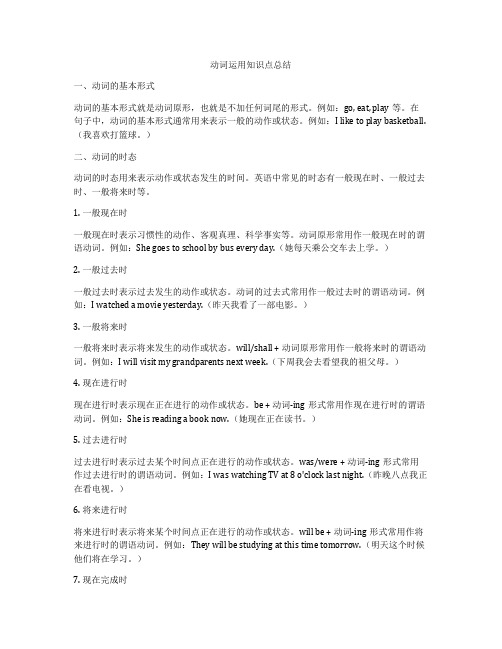
动词运用知识点总结一、动词的基本形式动词的基本形式就是动词原形,也就是不加任何词尾的形式。
例如:go, eat, play等。
在句子中,动词的基本形式通常用来表示一般的动作或状态。
例如:I like to play basketball.(我喜欢打篮球。
)二、动词的时态动词的时态用来表示动作或状态发生的时间。
英语中常见的时态有一般现在时、一般过去时、一般将来时等。
1. 一般现在时一般现在时表示习惯性的动作、客观真理、科学事实等。
动词原形常用作一般现在时的谓语动词。
例如:She goes to school by bus every day.(她每天乘公交车去上学。
)2. 一般过去时一般过去时表示过去发生的动作或状态。
动词的过去式常用作一般过去时的谓语动词。
例如:I watched a movie yesterday.(昨天我看了一部电影。
)3. 一般将来时一般将来时表示将来发生的动作或状态。
will/shall + 动词原形常用作一般将来时的谓语动词。
例如:I will visit my grandparents next week.(下周我会去看望我的祖父母。
)4. 现在进行时现在进行时表示现在正在进行的动作或状态。
be + 动词-ing形式常用作现在进行时的谓语动词。
例如:She is reading a book now.(她现在正在读书。
)5. 过去进行时过去进行时表示过去某个时间点正在进行的动作或状态。
was/were + 动词-ing形式常用作过去进行时的谓语动词。
例如:I was watching TV at 8 o'clock last night.(昨晚八点我正在看电视。
)6. 将来进行时将来进行时表示将来某个时间点正在进行的动作或状态。
will be + 动词-ing形式常用作将来进行时的谓语动词。
例如:They will be studying at this time tomorrow.(明天这个时候他们将在学习。
常用动词用法口诀

常用动词用法口诀动词是英语学习中的重要组成部分,掌握动词的用法对于学好英语至关重要。
下面为大家总结了一些常用动词的用法口诀,希望能帮助大家更轻松地理解和运用这些动词。
一、be 动词的用法我用 am,你用 are,is 连着他她它;单数名词用 is,复数名词全用 are。
变疑问,往前提,句末问号莫丢弃;变否定,更容易,be 后 not 莫忘记。
疑问否定任你变,句首大写莫迟疑。
比如:I am a student You are a teacher He is a doctor 当表示复数时,We are friends They are workers 要变成疑问句,Is she beautiful? Are they happy? 否定句则是:I am not tall They are not here二、have/has 的用法动词 have 表示“有”,位置就在主语后;“三单”主语用 has,其他人称用 have。
例如:I have a book He has a pen We have many friends 当主语是第三人称单数(he、she、it 或者单个的人名、地名等)时,用 has,其他情况用 have。
三、do/does 的用法do 与 does 来帮忙,动词原形跟着走;否定疑问靠它们,形式变化要记住。
主语若是三单式,does 出现动词原;其他人称都用 do,否定 don't/doesn't 加。
比如:I do my homework every day He does his work carefully 变成疑问句:Do you like music? Does she play the piano? 否定句:I don't like sports She doesn't go shopping on Sundays四、like 的用法like 动词真有趣,后面常把名词遇;动词 ing 也能跟,形式要看具体意。
初中常见的动词的用法
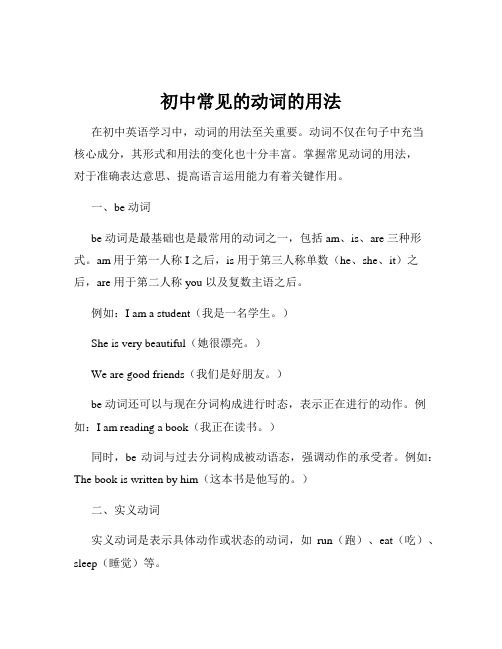
初中常见的动词的用法在初中英语学习中,动词的用法至关重要。
动词不仅在句子中充当核心成分,其形式和用法的变化也十分丰富。
掌握常见动词的用法,对于准确表达意思、提高语言运用能力有着关键作用。
一、be 动词be 动词是最基础也是最常用的动词之一,包括 am、is、are 三种形式。
am 用于第一人称 I 之后,is 用于第三人称单数(he、she、it)之后,are 用于第二人称 you 以及复数主语之后。
例如:I am a student(我是一名学生。
)She is very beautiful(她很漂亮。
)We are good friends(我们是好朋友。
)be 动词还可以与现在分词构成进行时态,表示正在进行的动作。
例如:I am reading a book(我正在读书。
)同时,be 动词与过去分词构成被动语态,强调动作的承受者。
例如:The book is written by him(这本书是他写的。
)二、实义动词实义动词是表示具体动作或状态的动词,如run(跑)、eat(吃)、sleep(睡觉)等。
1、及物动词与不及物动词及物动词后面必须接宾语,才能完整表达意思。
例如:I eat an apple(我吃一个苹果。
)“eat”是及物动词,“apple”是宾语。
不及物动词后面不需要接宾语就能表达完整的意思。
例如:Heruns fast(他跑得很快。
)“run”是不及物动词。
2、动词的时态一般现在时:表示经常发生的动作或存在的状态。
主语是第三人称单数时,动词要加“s”或“es”。
例如:He studies hard(他学习努力。
)一般过去时:表示过去发生的动作或存在的状态。
动词通常变为过去式,规则动词加“ed”,不规则动词有特殊的变化形式。
例如:I played basketball yesterday(我昨天打篮球了。
)现在进行时:表示正在进行的动作,由“be 动词+现在分词”构成。
例如:They are playing football now(他们现在正在踢足球。
初中英语动词+todo和+doing的用法

去游泳、钓鱼、逛街、滑冰、划船初中三年全部英语动词+doing 和+to do 句型全汇总!在初中英语学习中,想要取得高分语法和单词这两座大山一定要过,今天分享的是初中英语最常考全部英语动词 +doing 和 +to do 的总结,同学们可以抽时间好好记熟这些,千万别再弄混了。
一、带动词ing 形式1.keep doing 坚持做某事2.keep sb. doing 使某人一直做某事3.practise doing sth.练习做某事4.enjoy doing 喜欢做某事5.finish doing 完成做某事6.be afraid of doing 害怕做某事be busy doing 忙于做某事7. look forward to doing 盼望做某事8. how about doing 、 ./what about doing 做某事怎么样9.spend some time (in)doing 花时间做某事10.spend some money (in) buying 花钱做某事11.feel like doing 想做某事12.stop/keep/prevent ⋯ from doing 阻止某人做某事13.thank sb for doing 感谢某人做某事14.thanks for doing 感谢做某事15.do somecooking/cleaning/reading/shopping/washing做点饭、打扫一下卫生、读点书、逛逛街、洗洗衣服16. go swimming/fishing/shopping/skating/boating18.can ’t help doing 情不自禁做某事19.consider doing 考虑做某事20.have fun doing sth.. 做某事有趣21.have difficulty doing sth 做某事有困难have trouble doing sth 做某事有困难have problem doing sth 做某事有困难22.waste time/money doing 浪费时间或金钱做某事23.instead of doing 代替做某事24.miss doing 错过做某事25.hold on to doing 坚持做某事26.pay attention to doing 集中精力做某事27.suggest doing 建议做某事28.It ’s time for doing 到该做某事的时间了It ’s time to do sth. 到该做某事的时间了29.There is sb doing sth 有人正在做某事30.be used to doing sth 习惯做某事31.be used for doing sth 被用来做某事32.have a lot of experience 具有做某事的丰富经验33 sb allow doing sth 允许做某事34.put off doing sth 推迟做某事35.succeed in doing sth 成功做某事36.end up doing 以做某事结束37.give up doing 放弃做某事二、含有不带 to 的动词不定式句型17. mind doing 介意做某事 1. had better (not) do sth.最好(不)做某事2.would you please (not) do sth 你可以做某事吗?3.why not do sth. 为什么不做某事?why don ’t you do sth.为什么你不做某事?4.Shall we do sth.?我们要做某事吗?5.let sb do sth. 让某人做某事6.make sb. do sth. have sb do sth 使某人做某事7.feel sb do sth 感觉某人做某事三、含有带 to 的动词不定式句型1.It ’s time to do sth. 该是做某事的时候了2.It takes sb. some time to do sth 做某事花了某人时间3. tell/ ask/ want/encourage/invite/ sb. to do sth. 告诉、叫、想、鼓励、邀请某人做某事4.Would you like to do sth.?你想做某事吗?5.It ’s good/bad to do sth 做某事好 / 不好6.It ’s good/bad for sb.to do sth.对某人来说,做某事好 /不好7.be +adj.+ enough to do sth.足够 +形容词做某事8.sb. is ready to do sth.某人准备好做某事9.It ’s+adj.+ for sb. to do sth. 做某事对某人 +形容词(做这件事对你好)10. It ’s+adj.+ of sb. to do sth 某人做某事 + 形容词(你做这事真好)11. would like/love/decide/want/wish/to do sth. 想、喜欢、决定、想、希望做某事12.would like/love sb. to do sth.想让某人做某事13.prefer to do rather than do sth. 宁愿做某事而不愿做某事例如: I prefer to read rather than write . 意思33. in order to do sth 为了做某事同 I prefer reading to writing.又如: I prefer to stay at homerather than go out.再如: prefer=like better ,即: I preferred.=I like redbetter.14.how/ when/where/whether to do sth 怎么、什么时候、在哪里、要不要做某事15. can ’t wait to do 迫不及待做某事16.too ⋯ to do ⋯太怎么样而不能做某事17.be afraid /ready/able/sure to do 害怕、准备、能够、确定做某事18.It ’s time to do sth 到该干某事的时候了19.My job is to do sth 我的工作是做某事20.My dream is to do sth 我的梦想是做某事21.My hobby is to do sth 我的业余爱好是做某事22.refuse to do sth 拒绝做某事23.warn sb to do sth 告诫某人做某事24.pretend to do sth 假装做某事25.teach/learn to do sth 教做某事、 / 学习做某事26.need to do sth 需要做某事27.be willing to do sth 愿意做某事28. .try to do sth 努力做某事29.try one ’s best to do sth 尽某人最大努力做某事30.agree to do sth 同意做某事31.seem to do sth 好像似乎做某事32. plan to do sth /make a plan to do sth 计划做某事34. have a chance to d o sth 有机会做某事 57. lead sb to do sth 领导某人做某事 35. find it +adj + for sb to do sth 发现做某事是⋯⋯ 58. it's a goodplace to do sth 这是做某事的好地方36. have sthto do 有某事要做59. invit e sb to do 邀请某人做某事 37. There is sthfor sb to do 对某人来说,有某事要做60. get to do sth 设计做某事 38. be anxious to do 渴望做某事 61. expec t to do 期望做某事39. afford to do sth 支付得起做某事 62. volunte erto do sth 志愿做某事四、两个动作连用,表目的63. offer to do sth 主动提供做某事40. used to do sth 过去常常做某事 64. have an opportunity to do 有机会做某事 41. be used to do sth 被用来做某事65. get sb to do sth 使某人做某事42. be supposed to do sth 理应做某事,应该做某事 66. it ’s one ’sduty to do sth 做某事是某人的责任 43. allow sb to do sth 允许某人做某事 67. use sth to do sth 用某物做某事 44. sb be allowed to do sth 某人被允许做某事 68. be sure to do sth 一定会做某事 45. the bestway is to do sth 最好的方法是做某事69. have to do sth 不得不做某事46. the next step is to do sth 下一步是做某事 70. be able / unable to do sth 能够 / 不能做某事47. havenothing to do with与某事无关五、既用带 to 的动词不定式又用 ing 形式的句型 48. the firstthing is to do sth 第一件事是做某事1. stop to do/ doing 停下来做另一件事 / 停止做某事49. it ’s best todo sth 最好做某事2. forget to do/doing 忘记去做某事 / 忘记做过某事50. it ’s agood time to do sth 这是做某事的最好时间 3. remember to do/doing 记住去做某事 /记得做过某事it is a good way to do sth 做某事是个好的办法 4. go on to do/doing 继续做另一件事/ 继续做某事51. add to do 补充做某事 5. like to do/doing 喜欢做某事(临时 / 长期) 52. urge sb to do 催促某人做某事 6. love to do/doin g 喜欢做某事 (临时 / 长期) 53. educate sb to do 教育某人做某事 7. prefer to do/doing 更喜欢做某事 (临时 / 长期) 54. wait forsb to do 等待某人做某事8. hate t o do/doing 讨厌做某事(临时/ 长期)55. order sb to do 命令某人做某事 六、下列结构用带 to 的动词不定式56. happen to do sth 碰巧做某事和 ing 形式含义相同1. begin to do/doing 开始做某事常用双宾语动词汇总2.s tart to do/doing 开始做某事3.c ontinue to do/doing 继续做某事4.g o on doing 继续做某事5.t ake turns to do/doing 轮流做某事七、既用不带 to 的动词不定式又用现在分词的句型用不带 to 的动词不定式强调动作的完成过程;用现在分词强调动作的进行状态。
英语动词用法和意义
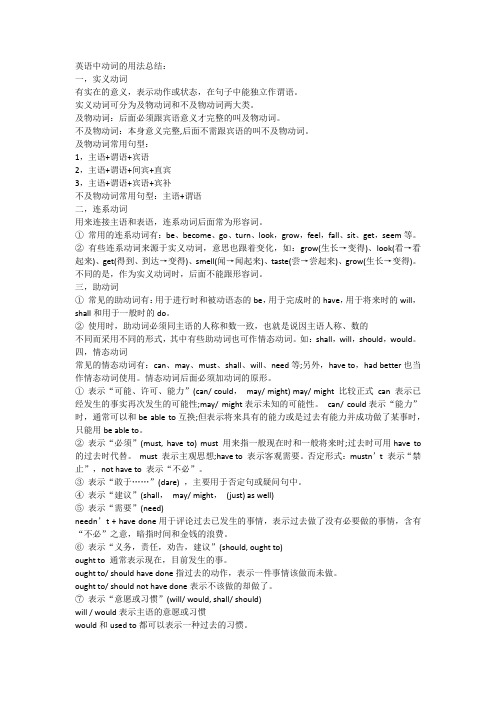
英语中动词的用法总结:一,实义动词有实在的意义,表示动作或状态,在句子中能独立作谓语。
实义动词可分为及物动词和不及物动词两大类。
及物动词:后面必须跟宾语意义才完整的叫及物动词。
不及物动词:本身意义完整,后面不需跟宾语的叫不及物动词。
及物动词常用句型:1,主语+谓语+宾语2,主语+谓语+间宾+直宾3,主语+谓语+宾语+宾补不及物动词常用句型:主语+谓语二,连系动词用来连接主语和表语,连系动词后面常为形容词。
①常用的连系动词有:be、become、go、turn、look,grow,feel,fall、sit、get,seem等。
②有些连系动词来源于实义动词,意思也跟着变化,如:grow(生长→变得)、look(看→看起来)、get(得到、到达→变得)、smell(闻→闻起来)、taste(尝→尝起来)、grow(生长→变得)。
不同的是,作为实义动词时,后面不能跟形容词。
三,助动词①常见的助动词有:用于进行时和被动语态的be,用于完成时的have,用于将来时的will,shall和用于一般时的do。
②使用时,助动词必须同主语的人称和数一致,也就是说因主语人称、数的不同而采用不同的形式,其中有些助动词也可作情态动词。
如:shall,will,should,would。
四,情态动词常见的情态动词有:can、may、must、shall、will、need等;另外,have to,had better也当作情态动词使用。
情态动词后面必须加动词的原形。
①表示“可能、许可、能力”(can/ could,may/ might) may/ might 比较正式can 表示已经发生的事实再次发生的可能性;may/ might表示未知的可能性。
can/ could表示“能力”时,通常可以和be able to互换;但表示将来具有的能力或是过去有能力并成功做了某事时,只能用be able to。
②表示“必须”(must, have to) must 用来指一般现在时和一般将来时;过去时可用have to 的过去时代替。
习惯用法
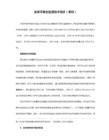
bring up 抚养
bring down 降低
bring out 出版
call
call off 取消
call for 邀约;请求
call in 召集
call on 拜访
call up 召集,动员;打电话;使人想起
=cannot hold back from doing Sth.
=cannot keep back from doing Sth.
=cannot choose + 动词原形
=cannot but + 动词原形
cannot help but do sth. 禁不住要做某事(用不带to的动词不id somebody in
aim at
apologetic for
apologize for
apprehensive of 对...担忧
aware of
awkward at
be afraid of
be capable of
be engaged in
be fond of
reject
relinquish
relish vt.爱好;喜欢
renounce
report
require
resent v.愤恨, 怨恨
resist
risk
sanction
shirk vi.逃避, 推卸
vt.逃避
shun vt.避开, 避免
stand
substantiate vt.使实体化, 证实
call back 回电话
consist
初中英语语法知识大全
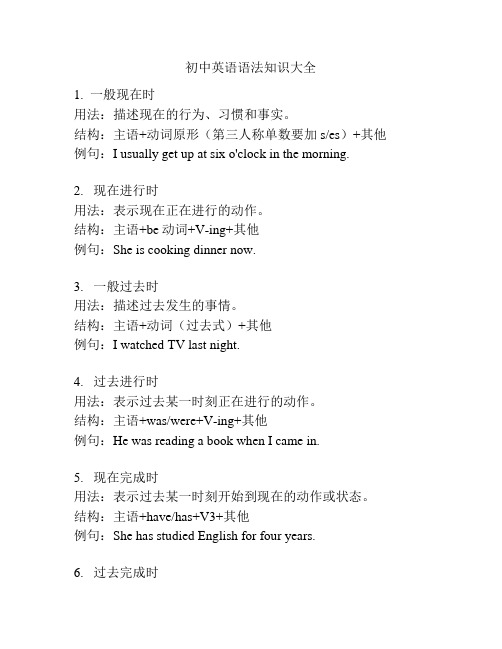
初中英语语法知识大全1. 一般现在时用法:描述现在的行为、习惯和事实。
结构:主语+动词原形(第三人称单数要加s/es)+其他例句:I usually get up at six o'clock in the morning.2. 现在进行时用法:表示现在正在进行的动作。
结构:主语+be动词+V-ing+其他例句:She is cooking dinner now.3. 一般过去时用法:描述过去发生的事情。
结构:主语+动词(过去式)+其他例句:I watched TV last night.4. 过去进行时用法:表示过去某一时刻正在进行的动作。
结构:主语+was/were+V-ing+其他例句:He was reading a book when I came in.5. 现在完成时用法:表示过去某一时刻开始到现在的动作或状态。
结构:主语+have/has+V3+其他例句:She has studied English for four years.6. 过去完成时用法:表示在过去某一时刻之前已经完成的动作。
结构:主语+had+V3+其他例句:I had finished my homework when he came.7. 情态动词用法:表示语气,如能否、可能性、义务、推测等。
例句:We should help each other.8. 动名词用法:表示动作,作主语、表语、宾语等。
例句:Swimming is good exercise.9. 形容词用法:用来描述人或事物的外在或内在特点。
例句:He is a clever boy.10. 副词用法:用来修饰动词、形容词、副词以及句子。
例句:She runs very fast.11. 不定式用法:表示动作的目的、用途、结果、时间等。
例句:I want to go to the cinema.12. 介词用法:表示动态或静态的关系。
例句:I am sitting on the chair.13. 连词用法:连接单词、短语或句子。
- 1、下载文档前请自行甄别文档内容的完整性,平台不提供额外的编辑、内容补充、找答案等附加服务。
- 2、"仅部分预览"的文档,不可在线预览部分如存在完整性等问题,可反馈申请退款(可完整预览的文档不适用该条件!)。
- 3、如文档侵犯您的权益,请联系客服反馈,我们会尽快为您处理(人工客服工作时间:9:00-18:30)。
初中英语常用动词习惯用法总结1. allow sb to do sth 允许某人去做某事(后接动词不定式)My father allowed me to go out for a walk after finishin g myhomework . 2. aske d sb (not) to do sth 叫某人做事某事(叫某人不要去做某事) My father asked me to study hard. He asked me not to swim alone. be asked todo sth被叫去做某事/被邀请去做某事I was asked to have a dinner with them yesterday . 3. be afraid to do sth 害怕做某事She is afraid to ask me question s.4. be afaid of doing sth 害怕做某事 I am afraid of going out at night.5. be afaid ofsth 害怕某物 He is afraid of snakes. 6. be amazed to do sth 对做某事感到惊讶He was amazed to meet the girl there.be amazed at sth 对某事感到惊讶they were amazed at the news.7. be busy doing/wi th sth 忙于做某事(常考)e.g: I was busy washing my car at that time. 那时候我正忙于清洗我的车子。
I am busy with my work. 8. be coming/g oing/lea ving/fiy ing/movi ng/dying(某些位移动词用进行时态时表将来) the bus is coming/t he dog is dying. 9. be excited to do sth 对做……感到兴奋 Jacky was excited to travel there by plane. be excited at sthLily was excited at his words.be excited about doing sthhe was excited about passing the exam without going overing books. 10. be frighten ed to dosth 害怕去做某事Sam is frighten ed to ride a horse.11. be glad/hap py to dosth 高兴去做某事sheis happy to clean the blackboar d with me.be pleasedto do sth 高兴做某事she was pleased to help the old man yesterday .bepleasedwith sth 对某事感到高兴/满意the teacherwaspleasedwith my answer.12. be interest ed in sth/doin g sth 对某事感兴趣/对做某事感兴趣she is interest ed in swimming in the river. My btother is interested in Chinese.13.be/get readyfor/to do sthBe ready for sth 为某事做好了准备 We are ready for the exam. Be readyto do sth 为做某事做好了准备We are ready to have abirthday party for her.get ready for sth为某事在做准备We are getting ready for the exam.get ready for sth 为做某事而做准备13. be sorry to do sth 对做某事感到抱歉14. be surprise d to do sth 对做某事感到惊奇 be surprised at sth 对某事感到惊奇 15. beworthdoing sth 值得做某事(worth后接动词-ing 形式,常考)16.in to dosthbegin/ start to do/doing sth17. can /be able to afford (to buy) sth 有能力购买(供)……18. can /may/mus t do sth could/wo uld/shou ld/might do sth 19. can ’t waitto do sth 迫不急待地去做某事 20. dec ide to do sth 决定去做某事 make up one’smind to dosth 下决心去做某事(常考)make adecisionto do sth 对做某事作出决定21. des erve to do sth 值得/应该做…… 22. enc ourage sb to do sth 鼓励某人去做某事 23. enjoy doingsth乐意去做某事24. expect (sb)to do sth 期望去做某事25. fai l to do sth 做某事失败 succee d doing sth 成功做了某事 26. finish doing sth做完某事(后接动词-ing 形式)(常考)27. follow sb todo sth跟随某人去做某事28.让某人做某事(后接动词原形)get sb to do sthmake sb do sthlet sb do sth 29. get /have a chance to do sth 得到一个做某事的机会30. giv e/pass/show/lend /sell sb sth/sth to sbbuy/get/b ring sb sth/sth for sb 31. go on to dosth 继续做事(常考)go on doing sth 继续做事(常考)32. hate todo/doing sth 讨厌/不喜欢做某事 33. hav e fun doing sth 34. hav e problems doing sth 做某事遇到困难 35.have sb dosthhavesth donehavesth to do 工有事要做36. hear sb dosth 听到某人做某事(后接动词原形,常考)hear sb doing sth 听到某人正在做某事(常见)37. help to dosth 帮忙做某事helpsb (to) dosth帮助某人做某事 38. hop e/wish to do sth 希望做某事 wish sb to do sth 希望某人做某事39. I tseemsthat 这像是……(后接从句)seemto do sthseem +adj 40. It’s +adj+(for sb) to do sth .It’s+adj +(of sb) to do sthe.g: It’s glad for him to hear the news. 41. It takes sb some time/mon ey to dosth . 花费某人多长时间做某事(常考) 42. pay …for… cost spend…o n….. it take …todo sth43. It’s bestfor sb todo sth.对某人来说做某事是最好的hadbetter dosth 最好做某事(注意had没有时态和人称的变化,better 后接动词原形)44. It’s time for sb todo sth 是某人做某事的时候了45. kee p(on)doin g sth 坚持做某事(常考)keep sb doing sth 让某人做某事(常考)keep sb from doing sth 阻止某人做某事(常考)keep sb/sth+adjkeep the book for 2 days 借这本书两天(不要用borrow 或lend)46. lea rn to do sth 学做某事learn sth from sb 向某人学习47. like todo/doingsth 喜欢做某事likesb to dosth 喜欢某人做某事48. need to dosth需要做某事need doingsth/to be doneneed sth needn’t do sth 49. pre fer to do sth rather than do sth 宁愿……而不愿……(常考)prefer doing sthto doing sth 喜欢做……胜过做……e.g: I prefer reading books to going shopping. 比起购物来,我更爱读书。
preferto do sth 喜欢(爱)做某事50. refuse to do sth 拒绝做……51.(常考) remember/forget to do sth 记得/忘记做某事 rememb er/forget doing sth 记得/忘记做过某事 52. seesb do sth 看见某人做某事(结果)see sbdoing sth看见某人正在做某事(正在进行中)be seen to do sth 做某事被看见53. som ething to eat/drin k 一些吃/喝的东西(词不定式放在somethin g等后修饰这些词)e.g: I need somethin g to eat. 我要一些吃的东西。
54. spe nd some time (in)doin g sth /on sth 花费时间做某事(注意动词要用ing形式)(常考)spend some money on sth/doing sth 买……花了多少钱55. Sth is hard/dif ficult/e asy to do . 做好某事很难/容易 56. sto p to do sth 停下来去某事(两件事)(常考)stopdoing sth 停止做某事 (一件事)(常考)stopsb (from)doing sth 阻止某人做某事(常考) 57. tak e turns to do sth 轮流做…… 58. tel l sb (not) to do sth 叫某人去(不要)做某事betold to dosth被告知不要做某事59. There is noneed (for sb) to do sth 对某人来说没必要做某事60. The re is no time (for sb ) to do sthhaveno time to do sth 没时间做某事61. too …(for sb) to …太……以致不能……so…that…not…enough to doe.g: The boy is too young to go to school.那男孩太小了以致不能上学。
